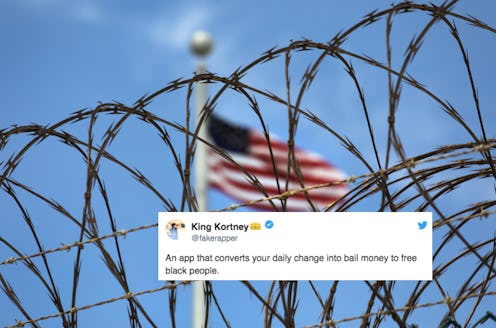Life
This App Will Donate Your Spare Change To Help Pay Bail For People Who Can’t Afford It

Mass incarceration in the United States is a huge problem. One of the many things activists are criticizing about the United States’ prison culture is the bail system. Bail is the money an arrested person must pay to the court in order to be released from custody with the understanding that they will return for required court appearances. If you cannot afford bail, you have to stay in jail until their court date. Low-income and people of color disproportionately remain in jail because they can't afford bail, while wealthy people are able to pay for their freedom. While calls for comprehensive bail reform are gaining traction throughout the country, advocates are taking direct action to raise funds to help folks bail out of jail. The founders of Appolition, an app that donates spare change to bail funds, are making donating to bail funds more accessible for everyone with a bank account.
Last night in America, around 450,000 people were in custody at local jails without being convicted of a crime. Why? Mostly due to financial hardship. The bail system was initially created as an incentive for people accused of a crime to come back to court, according to HowStuffWorks. The concept of bail has existed in the United States since the 1700s. The last time the modern bail system was reformed was in 1984. If they come for their scheduled court appearance, they get their money back. But that’s not how bail works in practice.
Poor people, mainly of color have to decide between pleading guilty to a misdemeanor (with an accompanying sentence of no jail time) in order to go home, or sit in jail until the court can hear their case. This can take weeks or even months. As a result, defendants who are unable to post bail are nine times more likely to plead guilty to a misdemeanor. Pleading guilty to a crime — even if it’s a misdemeanor — can put defendants at risk of losing their homes and jobs.
America has 5 percent of the world’s population, but over 20 percent of the world’s incarcerated population, according to the ACLU. That makes the United States the country with highest incarceration rate in the entire world. Children as young as 14 years old have been sentenced to death. The United States’ criminal justice policies make second chances nearly impossible for those who have been incarcerated. Making bail funds available to those who cannot afford it has the potential to change the course of millions of lives.
So how does Appolition work? First, link your bank account the same way you would with Venmo or other apps that handle money. Linking a bank account creates a connection that lets Appolition know how much money you're spending and how much can be rounded up. Next, spend like you normally would. Your purchases will be rounded up to the next dollar. So, if you spend $3.86 on a cup of coffee, 14 cents will be "rounded up," or set aside to donate to Appolition's bail fund. Once your spare change reaches $2, it will be donated automatically. After connecting your account, you’ll be able to start automatically donating within 60 seconds. Appolition takes care of the rest. You can also pause and resume automatic donations at anytime, and keep track of how much you’ve contributed by looking at your personal dashboard.
Appolition joins the ranks of other direct action campaigns that aim to help folks bail out of jail. One organization that has a proven success record is the Brooklyn Bail Fund. To date, the Brooklyn Bail Fund has bailed out 1,500 New Yorkers. Their clients are twice as likely to have favorable case outcomes, and 95 percent of them return for all court dates. The average bail the fund pays is $910, a substantial amount of money to many Americans.
Currently, the bail system in the United States disproportionately negatively impacts poor people for being too poor to afford bail. Money shouldn’t buy justice, but until comprehensive bail reform is a reality, you can do your part by donating bail money to those who cannot afford it.